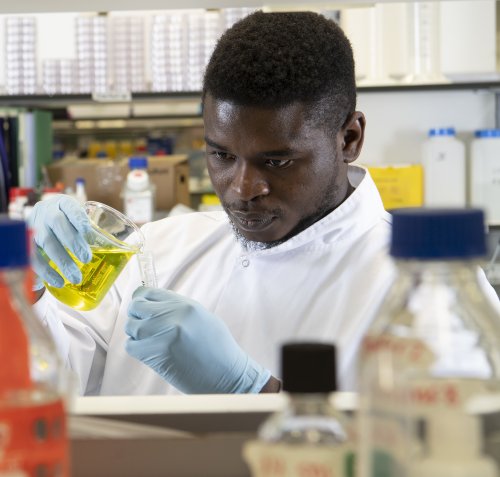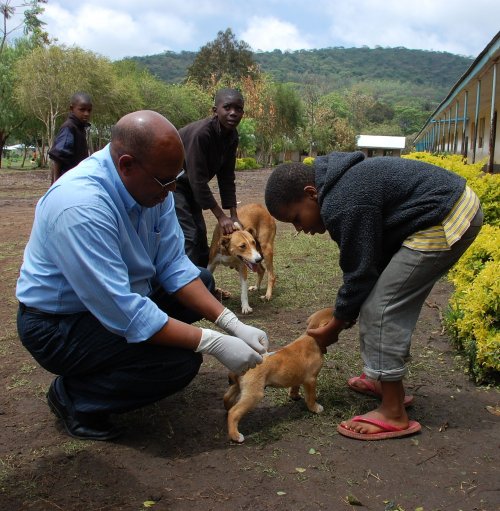COLLABORATION
Working together to tackle bigger challenges
Research is crucial for addressing societal problems and bridging gaps in knowledge, though it can take years to transform outputs into impact. In this strategic cycle, we have facilitated collaboration across disciplines, institutions, industries, sectors, entrepreneurs, and government.
New spaces for research
We have significantly expanded our research infrastructure with the development of new campus buildings on the site of the old Western Infirmary. The magnificent Mazumdar-Shaw Advanced Research Centre (ARC) was the first building to open in June 2022. The ARC – which spans 16,000 square meters over five levels – is designed to promote collaboration, pioneer new ways of working, and act as a catalyst for strengthening relationships between the University and its stakeholders.
Since opening, the ARC has hosted 1,198 research engagement events, with interdisciplinary and collaborative activities being a priority; nearly 70% of the events hosted were developed by multiple University Schools, Colleges, or external partners. The ARC has also welcomed nearly 14,000 public and school visitors through initiatives such as the ARCADIA Launch Festival and Winter Warmer Christmas events, and partnerships with major festivals including Glasgow Science Festival and Explorathon.
The Clarice Pears building opened its doors in 2023 and has since offered a unique space for research and community collaboration. The Byres Hub, which occupies the building’s first floor, aims to forge and sustain meaningful engagement with our civic partners and local communities. This ever-growing community includes grassroots voluntary organisations, charities, community interest companies and statutory services – all with an interest in improving health and wellbeing in Glasgow and beyond. The Hub is developing new research questions through lived experience panels, enabling the public to shape and participate in research studies, and supporting research at the proposal stage.
The latest building to open on the Western site is the new Adam Smith Business School. The new building supports the School’s analytical, entrepreneurial and sustainable mission in business and policy, with Adam Smith’s legacy inspiring colleagues to develop their thinking for businesses, organisations and economies. It also enhances the School’s capacity to develop curiosity-driven and challenge-led research by providing richer interactions and collaborations with stakeholders in business, organisations and policy.
University Research Strategy and its three pillars have served as a blueprint for our College strategy which has fully incorporated the values and aims of the University into College research. Professor Gerard Graham, Dean of Research, College of Medical, Veterinary and Life Sciences
In the College of Social Sciences, collaboration is key to addressing local, national, and global issues with exceptional social science. The College has established interdisciplinary research themes to encourage researchers to work across disciplines on pressing problems such as health, climate change, peace, and inequalities. The Centre for Public Policy, established in 2023, aims to bridge the gap between research and policy. Professor Melanie Simms, Dean of Research, College of Social Sciences

A researcher working in the Wolfson Wohl Cancer Research laboratories
Glasgow Changing Futures
Glasgow Changing Futures (GCF) is a strategic programme, representing the University’s commitment to integrating research, innovation, education, and partnerships to advance interventions to local, national and global societal challenges. Initially, GCF focuses on two priority themes, ‘Sustainable Futures’ and ‘Healthy and Equitable Futures’, and aspires to develop impactful solutions to these challenges through equitable partnerships built around collaborative creation and delivery.
A strong leadership team will be taking GCF forward. In 2024, we appointed Professor Jamie Cross as Academic Director for GCF, Professor Jaime Toney as Academic Lead for Sustainable Futures and Professor Petra Meier as Academic Lead for Healthy and Equitable Futures. Dr Maria McPhillips has been appointed as the Challenge Programmes Director. Over the coming months, the GCF team will be undertaking inclusive consultations with colleagues and partners to explore and shape the programme’s investments and activities and work towards realising the ambitions of GCF.
Scotland Beyond Net Zero
Scotland Beyond Net Zero (SBNZ) is a coalition of climate and sustainability experts committed to achieving beyond net zero. We co-founded SBNZ with the University of Edinburgh in January 2024, and the coalition has since grown to have ten University members.
SBNZ aims to address the major climate challenges facing Scotland. The goal of the coalition is to harness the strength of universities across Scotland to advance innovation, research collaboration, community engagement, and inform policymaking.
Since January, SBNZ has introduced a £130k seed fund offering awards of up to £15k and has begun developing a climate toolkit to help researchers assess the impact of their work on achieving net zero and incorporate broader climate concerns into their research.
Strategic Research Initiatives
Our new Strategic Research Initiatives team, set up in 2022, works in close partnership with academic and research professional staff across the Colleges and University Services to strengthen the provision of dedicated and joined-up research support available to our academics, and enhance the University’s collaborative research environment, ambition, and culture.
Through this collaborative approach, the team is nurturing new collaborations across disciplines to achieve a state of readiness for future funding opportunities. By coordinating institutional responses to funding calls, the team ensures the University is well-positioned to respond with coherent and compelling value propositions for major cross-disciplinary bids.
New Academic Leads to improve approaches to good and inclusive research practice
In 2023, the research strategy was discussed with each School and the University Professional Services Group through roadshow events. A recurring topic at these events was our research environment, highlighting the need for good research practice and greater inclusion. This led to the creation of two new part-time Academic Lead posts: Good Research Practice and Inclusive Research Practice.
In her role as the Academic Lead for Inclusive Research Practice, Professor Doris Ruth Eikhof leads a programme of work that translates our commitments to inclusion and diversity into meaningful actions across all areas of research.
Doris sees her role as encouraging open dialogue, building on existing progress and supporting continuous improvement. She is currently supporting the Glasgow Knowledge Exchange Fund and Impact Acceleration Account teams in making our award and delivery of these funds more inclusive. With colleagues from across the University, Doris is working on providing meaningful diversity data for research. This data will enable us to monitor the impact of how we do research on who gets to do research.
In her role as the Academic Lead for Good Research Practice, Professor Lisa DeBruine is focusing on how we can make good research practices possible, normative, and easy through education and infrastructure. This involves working closely with researchers to understand their diverse needs; with professional services colleagues to understand existing resources; and with national colleagues in her role as institutional lead to the UK Reproducibility Network.
Lisa is currently working with Research and Innovation Services to mobilise the integrity advisor network towards a more proactive, positive research practice approach, as well as chairing a working group on responsible use of metrics. She is also passionate about facilitating grassroots networks of researchers to support each other in practices such as computational reproducibility checks. Lisa hopes to use this role to help the University maintain and enhance its reputation for methodologically and ethically rigorous research.
The College of Science and Engineering’s interdisciplinary research has been transformed by our presence in the Advanced Research Centre, fostering new ideas by co-working alongside colleagues from across all Colleges. We have strong engagement with colleagues in the College of Medical, Veterinary and Life Sciences, building collaborations from our solid base of diverse research in healthcare technologies. All this has been enabled by research support that is working seamlessly across the Colleges. Professor Margaret Lucas, College of Science and Engineering
Sustainable and equitable research
During the period of pandemic-related travel restrictions, our international research teams developed new ways of working to maintain their collaborative research programmes. While international travel has largely returned to "normal", the climate crisis means it is important to critically consider our international travel footprint. Drawing on the knowledge of the research community from across the University and beyond, new practical guidance has been developed to support international research teams to reduce their travel footprint while maintaining robust programmes of equitable and world-changing research.
Investing in global challenge research
We have continued to support international development research, focusing on equitable partnerships with two significant funding schemes. Firstly, the GCID Small Grants Fund – which has a strong emphasis on interdisciplinarity, equitable relationships, and support for early career researchers – has supported 35 initiatives since its launch in 2022.
International research teams led by the University are already demonstrating success in converting this support for collaboration into successful external awards. This includes a project that examined the challenges faced by educators in Lebanon and Jordan, and co-created professional development opportunities with teachers in these countries. The project secured follow-on funding from the British Council, and the lessons learned are now informing approaches to support educational resilience in Gaza.
In late 2023, a block award of International Science Partnerships Fund Official Development Assistance funding was allocated to the University. Leveraging the GCID Small Grants established processes, we were able to quickly allocate funding to key strategic research areas. Among the 28 initiatives funded are the Africa-Europe clusters of research excellence; the Serengeti biodiversity programme; and inclusive place-based methodologies for climate change impacts and adaptation in sub-Saharan Africa.

Rabies vaccinations in Arusha, Tanzania
Partnerships in action: from local to international
Collaboration is at the heart of Glasgow’s approach to societal challenges. A great example of an international, equitable collaboration is our research-led Blantyre-Blantyre Partnership with Kamuzu University of Health Sciences in Blantyre, Malawi. Our two institutions found that by collaborating on a new laboratory facility, we could develop research programmes to improve healthcare in both Blantyre, Scotland and Blantyre, Malawi by comparing the causes of poor health and low life expectancy in these areas.
Our researchers work with partners at every level from the local community to the international stage, focusing on both single issues and global concerns. Since 2019, the University has been a member of CIVIS, an alliance of 11 research-intensive universities across Europe working to create an inter-university space for innovative and responsible teaching, research, cultural exchanges and citizen action across Europe and Africa. At Glasgow, CIVIS is a close collaboration between the External Relations Directorate and Research Services, and aligns with the University’s international and civic strategies. In 2023, we built on the CIVIS platform to provide grants to community organisations in Glasgow to support collaborative work with researchers on community sustainability projects.
Networks such as Universitas 21, the Guild of European Research-Intensive Universities, CIVIS, and strategic partnerships with Sydney and Radboud, play a key role in our international collaborations. Furthermore, we have continued our strong commitment to forging partnerships across Europe, and invested significantly in sustaining European collaborations in anticipation of the UK’s association with Horizon Europe, which was eventually realised in January 2024.

